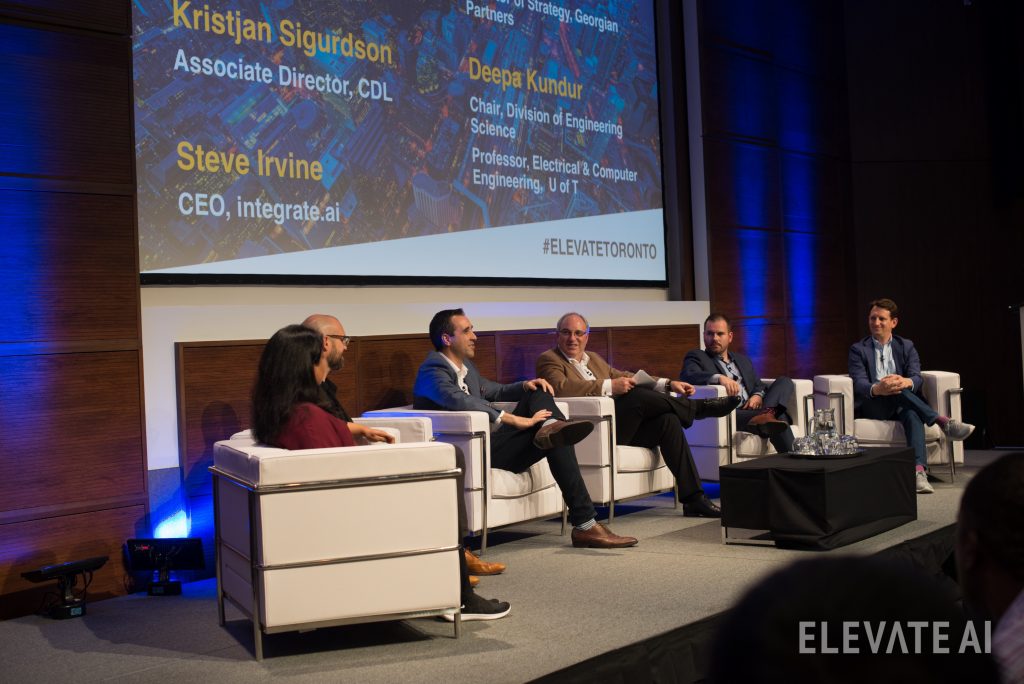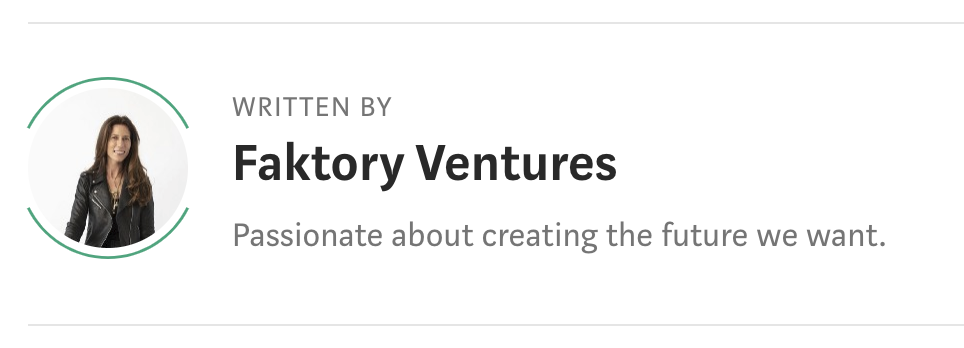
Just over a week ago, I helped produce and emcee ElevateAI along with amazing partners Darin Graham, Vector Institute, Lisa Zarzenzcy Mars, and Rachel Harris, CDL.
The intention of the day was to bring some of Toronto’s and Canada’s brightest minds in AI together to share the complex and interesting story, opportunity and questions that are upon us in the age of artificial intelligence. Our goal was to encourage the wider tech and business community to lean in, get curious and engage in shaping this story for the world.
Geoff Hinton, the godfather of AI, laid the foundation with a funny and informative overview of neural networks and deep learning. Tomi Poutanen, co-CEO of Layer6, a pioneer in the space, shared the back story of the massive role Canada has played in developing the global AI community which includes educating and growing the talent that now are the Heads of Facebook AI, Open AI, Apple AI and other AI superpowers. Tomi stressed the importance of creating AI companies in Canada rather than continuing to see the talent brain drain.

We heard from some of of the strongest AI companies and research labs in the country (Niraj Bhargava at Fluent.ai, Sanja Fidler from UFT Machine Vision, Mohamed Musbah at Maluuba, and Inmar Givoni at Kindred) who showcased their progressive work in voice AI, machine vision, natural language processing and robotic AI. Sanja ended with some humour stating “AI is not only the new tool but the new cool”.
We invited Gary Bolles, Future of Work Chair, Singularity University, and Krista Jones, MaRS, to share their perspectives on how AI will shape the future of our work and careers. Gary talked about the need to adopt a growth vs fixed mindset, as we need to reimagine work, rather than only fear it being replaced by AI.
It was clear the audience favoured our two youngest panelists, both 16-years-old, and members of The Knowledge Society, a startup in Toronto focused on exponential education: Ananya spoke about using deep learning in genomics, and Gaurav, who spoke about how schools aren’t exposing youth to these significant trends. Their curiosity, passion and knowledge was remarkable.
We were privileged to haveYoshua Bengio, co-founder of ElementAI, and another Canadian pioneer in deep learning. Yoshua shared his thoughts on how Canada needs to build an integrative and innovative model for AI commercialization that straddles the worlds of academia and industry. Yoshua stressed the need to encourage exploratory research so Canada can attract the best talent in the world, and believes that much of our breakthroughs are because researchers took risks in research, when that research wasn’t trendy.
We shared how different models of enterprise innovation were being experimented with from corporate research labs like Thomson Reuters, to traditional consulting firms like Deloitte, to new innovative enterprise startups like Integrate.ai that offer a an AI platform for customer engagement. The biggest challenges discussed were the need for companies to shift their mindset around data from a deterministic one to a probabilistic one, the massive shortfall of talent in all areas of AI, and the lack of usable, sizeable, clean datasets.
Since AI is so broad in its application, we wanted to showcase a diverse group of startups, disrupting their industries. We heard from:
- Elucid Labs and how they are revolutionizing cancer detection;
- Plantiga (a company I invested in) revolutionizing sports through their human movement intelligence platform:
- Nudge revolutionizing relationships in sales; and
- Acerta, revolutionizing manufacturing through anomaly detection.
Many of these companies are being incubated at the Creative Destruction Lab (CDL). With more than 100 AI startups entering the program this coming year, CDL is on target to be the largest AI incubator of its kind.
Finally, we discussed how Canada must build a globally competitive AI ecosystem. Many SV leaders including Vinod Khosla and Elon Musk believe that the need to win globally is not one of pride, but rather one of necessity as nations that lead in AI will have extreme military and economic advantage. Russia and China are both aggressively investing in AI. In Canada, we are competing to attract the world’s brightest minds in Machine Learning to do research here and build companies here.
It is clear we are seeing tremendous interest from local and global venture capital. Entrepreneurs like Steve Irvine, of Integrate.ai, are returning from the US to start companies here. Jordan Jacobs, co-founder of Layer6, also spoke about building a globally relevant AI platform from Toronto and creating The Vector Institute to attract the world’s best researchers here.
The day ended with an outstanding keynote from Dan Debow, founder at Helpful, and serial entrepreneur, angel investor and founder of CDL. His overriding message was that if we are to win, we must build really sizeable, scalable AI companies here and not become “economic serfs” to other ecosystems.
It was a great first year and a huge thank you to all the speakers and attendees! Should we do it again? If so, how could we make it even more interesting, compelling and useful? Please share ideas/feedback in the comments.





 U of T researchers to feature prominently during three-day Toronto tech festival
U of T researchers to feature prominently during three-day Toronto tech festival